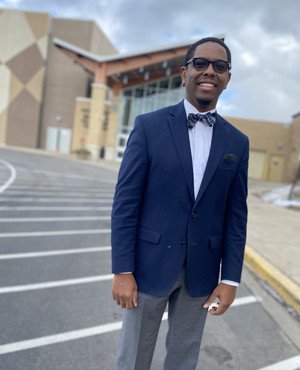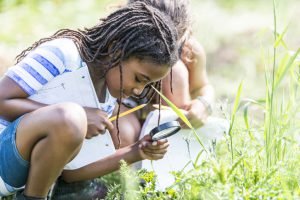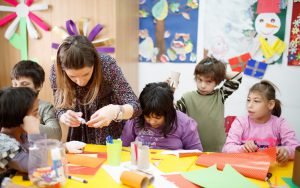
Every district leader spends time thinking about creating an equitable school environment for their students.
Ed.D. student Willie Garrison is passionate about creating an equitable school environment.
Getting ready for the new school year is a busy time of year. As the Director of Teaching and Learning for the School District of Brown Deer, Willie Garrison is embracing this preparation time. Garrison is getting ready not only to serve and lead his students, but he’s also preparing to wrap up his work as a doctoral student at Concordia University Wisconsin in the LICI program. Both as a school leader and in the classroom, Garrison focuses on creating a more equitable future for his students.
Equity is an action word.
In his role as Director of Teaching and Learning, Garrison is effectively the Assistant Superintendent. Within the Ed.D. LICI program, Garrison is preparing for the methods part of the dissertation.
Equity in action: closing the achievement gap
He is also involved in other Concordia programs, though. Garrison is the president-elect for the Closing the Achievement Gap Consortium and will be leading the 38-district consortium in the next two years. Over the years, he’s been involved in many of the projects and believes getting involved is important.
“I’ve been in every area of the consortium. I’ve been a part of it from the beginning. A lot of times we talk about doing the work, but I wanted to be sure I, as an African American male, was part of the work,” says Garrison.
He continues: “We need to be direct and focused on what we are doing for the historically marginalized groups. It could be Black students, white students, ELL, any historically marginalized to the gifted and talented. A true equitable system is looking how to impact the entire system. I’m part of the work, not just sitting at looking at the problem and saying, ‘We’ve got to do something’ and no one does the work. I want to be a part of the work and able to say here’s the work I have done, not just glorifying the work.”
For Garrison, equity is not passive work. “Equity is an action word. The word ‘equity’ and the word ‘action’ both have 6 letters. They are similar in nature. I believe equity is action work and always has been, even from 1863 until now. Anytime you make a change for a people group it has required action.”
Another one of Garrison’s passions is mentorship in the schools. Garrison’s research in the LICI program focuses on community mentorship. “Mentoring does work,” says Garrison, “even though there can be a lot of plusses and minuses. It impacts students in a positive way.”

Equity and achievement go hand-in-hand.
Garrison’s experience in the Wauwatosa School District as Director of Equity and Student and Family Services helps him as a leader in Teaching & Learning. “You can’t talk about equity without talking about achievement,” says Garrison, “I’ve always been in the teaching and learning platform. It was a natural transition.”
Teaching and learning encompasses a range of responsibilities and Garrison isn’t afraid to tackle them all. And for those teachers who think learning and implementing equitable practices is hard, Garrison suggests looking at it from another angle.
Leaders should approach equity with a pipefitter strategy.
Garrison encourages people to think about the question at hand and how it can be solved—not to overcomplicate it.
“Instead of saying that it’s harder, we just need to be more innovative. How can we get to the more important questions? Innovation has always driven society. Let’s teach students what’s important” says Garrison.
Garrison says working to solve equity issues should be no different than any other job. He suggests teachers and community members look at what’s not working and put things together to make it work.
Pipefitters make things work better.
“Think about it like pipefitters. They have an issue and two pieces of pipe .They just have to make sure it all fits. Yes, some things are straightforward and some things we have to be more innovative with, but really we’re just working to make things better.”
Garrison asserts that equity is a misnomer. He says, “People glorify it. Some things we know we should be doing. For example, we know according to research that suspensions don’t work. Yet, suspensions are still commonplace. The straightforward response is to stop suspending students, but sometimes there are other pieces we have to consider.”

Know yourself, and know your students.
Garrison understands who he is and who his students are. This is a huge reason why he feels successful in his work. He wishes all teachers would have a better sense of who they are as individuals. “We have to be better,” says Garrison, “I want all teachers to have a strong sense of who they are. Someone in front of our kids has to know how their biases may show up or not. We are impacting students. In the education world that we work in, someone is looking up to you. I’d love all my teachers to know who they are.”
Be a lifelong learner.
Garrison ties this recommendation back to studied research and recommended the work of William Cross, theorists and research on Black identity development.
Garrison notes: “Cross has written tons of work about identities. His framework for Black and African American identities is the same model that other philosophers have followed, such as Janet Helmes. There is a lot of information out there about this. It’s important to know how you show up as a person. In our society we can forget how important it is to know who we are. Kids are looking up to you. If your teacher doesn’t take care of you, you feel ostracized.”
“I believe you can. Now show me.”
In addition to understanding who we are, Garrison tries to create an environment where teachers can establish relationships with students. “It’s so important for teachers to have a deep sense of what it means to establish strong relationships,” he says, “. . . an approach I want teachers to know is kids want to feel a connection. I would hope our teachers take the time to do what it takes to build strong relationships.”
Finally, Garrison wants teachers to meet students where they are at believe in them wholeheartedly. “Accept all students for who they are. Have the mindset of ‘I’m not trying to fix you, or be your savior, I’m just here for you.’ Sometimes teachers can come off as knowing better, but really all we need to do is convey the message ‘I’m here to accept you. I believe you can achieve at high levels. John Hattie’s research says that the teacher belief is super important. We need students to know: “I believe you can learn. Now show me.”
“I feel privileged to be here. I wish there was a better way of getting a doctorate degree into the hands of even more folks.”
Trust in your team.
Have you ever had a colleague call your work extremely fun? Garrison says this is one of the favorite things about his job. “The best part is working with teams committed to doing whatever it takes. It can be extremely fun. It reminds me of a book called The Energy Bus. With the right people, so much can get done. No egos, just people wanting to do what’s best for the education system.”
Allow others to inspire you.
“I’ve always wanted to be in education,” Garrison shares. “I thought there was a better way of doing things. Miss Hayes was one of those teachers, who I don’t know if she was trying to motivate me to be better, or what, but I would always challenge her and say ‘there’s a better way to do this.’ And she would believe me and let me try. One of my math teachers, Miss Pernell, said ‘If you think there’s a better way, then show me. I also had an English teacher who challenged me to be better in my writing and broadcast my success in writing. She pushed me to be better.”
Channel your own experiences for good.
Garrison is in education to make a difference. He always knew he wanted to work in a field where he could make a difference. He considered working with at-risk juvenile kids, but ultimately decided on education.
“I knew if we worked together, we could make it happen.” Garrison knows first-hand what it’s like when the education system isn’t working for a student. “My thought was – ‘Maybe if I was a teacher, I could inspire students to do and be better.’ In 6th and 7th grade, I had the most suspensions of any kid. I was floored that the administrator could paddle me, that it was even an option. I didn’t understand the teaching system. From then on, I always wanted to work in schools.”
Stay grounded.
Faith, family, and football keep Garrison focused on thriving in his work, finishing his degree, and enjoying time outside of work. “Faith, family, football is what I come back to. I love my family. My faith keeps me grounded. And with football, like education, I like the team aspect. Who you have around you is super important.” says Garrison. “And I know sometimes if the team isn’t strong yet, it doesn’t mean it can’t get there-football or educators. Teams change. When you do get to work with a good team, let’s keep it together as long as possible because you don’t know how long it’ll last.”
Garrison said his doctoral work at Concordia has helped to positively impact his work. “I feel privileged to be here.” Says Garrison, “I wish there was a better way of getting a doctorate degree into the hands of even more folks.”
Do you want to know more?
Concordia University Wisconsin offers a Doctorate of Education in Leadership in Innovation and Continuous Improvement. This program’s cross-disciplinary nature allows for students to thrive as creative innovators who are set apart to make a significant impact in their different vocations. For more information about the Doctorate in Education in Leadership and Innovation and Continuous Improvement, visit this page.
—
If this story has inspired you, why not explore how you can help further Concordia's mission through giving.